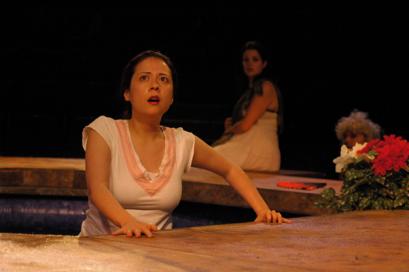Metamorphoses: all emotions on deck

In Metamorphoses Theatre Company's production of Chicago playwright Mary Zimmerman's Metamorphoses (based on Ovid’s myths of the same name), the ten actors constantly circle into and out of pool of waist-high water - a backyard children's pool edged with stairs and a faux-stone "deck" that functions as the stage.
When bodies on stage have to deal with physical elements like wind orheat or water, they move differently, which changes the baseline forhow a story can be communicated. In this case the actors bodies -almost continuously wet – demand attention and don't easily fall backinto a neutral stance, and I enjoyed that unique focus. The water is the focus of Zimmerman's script; director Christine Willes and her group of actors - the Metamorphoses Theatre Company formed specifically to mount the play in Vancouver - exploit the possibilities of the pool fully.
Each of the 13 myths gets the characters wet in, or beside, that pool. The water creates much of the soundscape - loud splashes, subtle drips or neutral lapping noises inform different scenes - so the soundscape is often spontaneous.
The result is energetic. Speaking over the sounds of splashing, or dealing with the water as a drag on the body, made some scenes raw, others graceful. Since the stories are generally familiar ones (the myth of Midas and his golden touch, for example) much of the surprise comes from how the water affects the actors so physically. They have to navigate the slippery deck, choreograph their movements with heavy waterlogged clothes, calculate the timing required to fake-drown someone without injury.
Because of the constant presence of and interaction with water, the performance becomes body-based; as I mentioned above, they can’t return to “neutral” as easily because the water keeps dripping off their clothes (there are a lot of costume changes in this production to start scenes dry!) or because an actor is catching their breath after diving, for example. One of the best uses of water was when Ceyx (James Behenna) drowns at sea, despite being son-in-law to Aeolus, the keeper of the winds. Two actors (Robert Tadashi and Ian Smith) leap into the pool and splash up the fatal storm, dragging Behenna and the other sailors into the water. The connection for the audience is visceral; action and dialogue hold equal power.
This reveling in physicality adds to the emotional arcs of the myths. A poignant example of this was when Myrrha (Michelle Kim) spurns all her lovers and Aphrodite curses her with desire for her father. When Myrrha and her father (blindfolded) dip under the surface to fuck, the gesture mimics the "diving in" or "crossing the line" that occurs when we choose to do something forbidden. The water easily shifts, then, into being a metaphor for the unconscious.
With these relationships in place - the water as the location of unconscious and unpredictable desires, and the body as vulnerable to what those desires dictate - Zimmerman drops the tone to quietness and slowness. The story of Orpheus and Eurydice, which comes next, is fresh again because of that contrast.
It’s a subtle, moving scene. After the long, sad journey to the underworld, Orpheus (Behenna) breaks his promise not to turn back and looks over his shoulder at to Eurydice (Leslie Brownlee). He loses her, as we knew he would. Four times. Each time, Hermes (Smith, as the god charged with leading her to the surface) lifts her into a graceful flying pose, and she, softly, stunned, says only - "Farewell." The scene balances perfectly on the line where pathos avoids sentimentality because of its commitment to a slow pace (allowing longing to unfold, rather than stating it), and because of its placement within the overall performance.
At their emotional core, Ovid's stories still resonate. There's an intensity that can come from working with emotional simplicity - humans long for connection; betrayal always hurts; it's difficult to trust your own heart's wisdom. The simplicity is embedded in Zimmerman's script and the Metamorphoses Theatre Company pulls it off. (My only complaints - there are a few moments of over-acting and over-production - a stock villain's laugh distracts; the elderly gestures of an old couple are stereotyped; and period costuming doesn't make sense because it shows up in some scenes but not consistently, and it was unnecessary). It is refreshing to feel the stories through the characters' struggles with water, as much as through hearing their narratives and dialogues.
When Eros (Jones) and Psyche (Brownlee) meet again after forced separation and the many trials that Psyche completes to win her love back, the simplicity is physicalized: the two float on a red cushion, quiet, tender, grateful that trust had been restored. It is a good note to end on as we brace ourselves for returning from the stage-side, or poolside, to the rest of of our complicated lives.
* * * * * * * * * *
Produced by Metamorphoses Theatre Company, from July 31 - August 16 at the Pacific Theatre.
Written and Originally Directed by Mary Zimmerman
Director: Christine Willes
Actors: Kiki Lightburn, Katherine Coupland, Evelyn Neufeld, Michelle Kim, Leslie Brownlee, Robert Tadashi, Chris Ireland, James Behenna, Vaughn Jones and Ian Smith.



